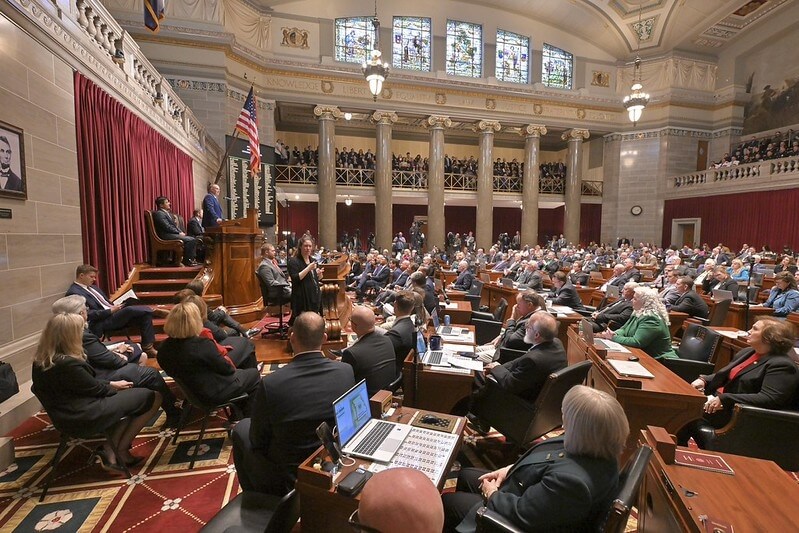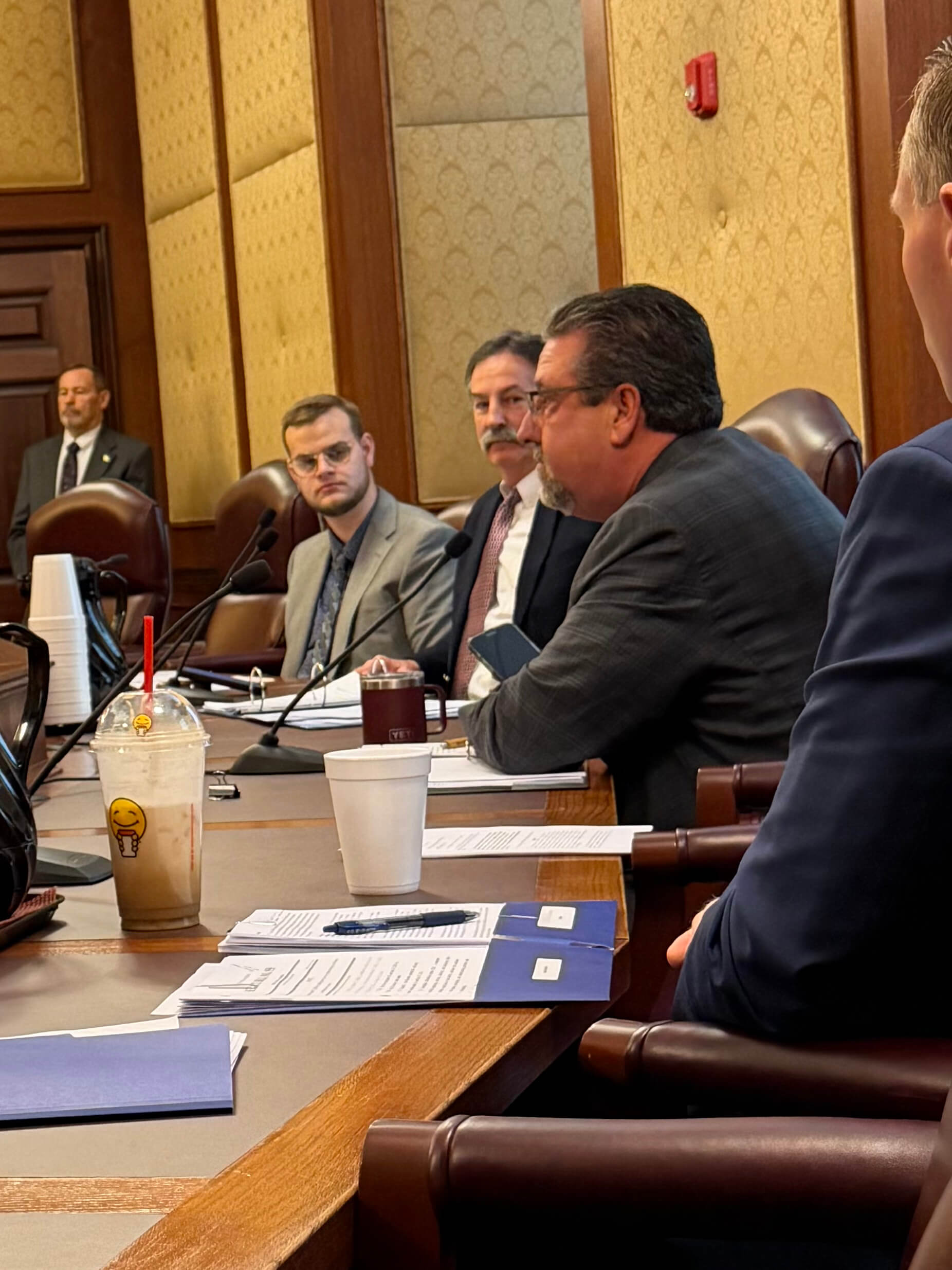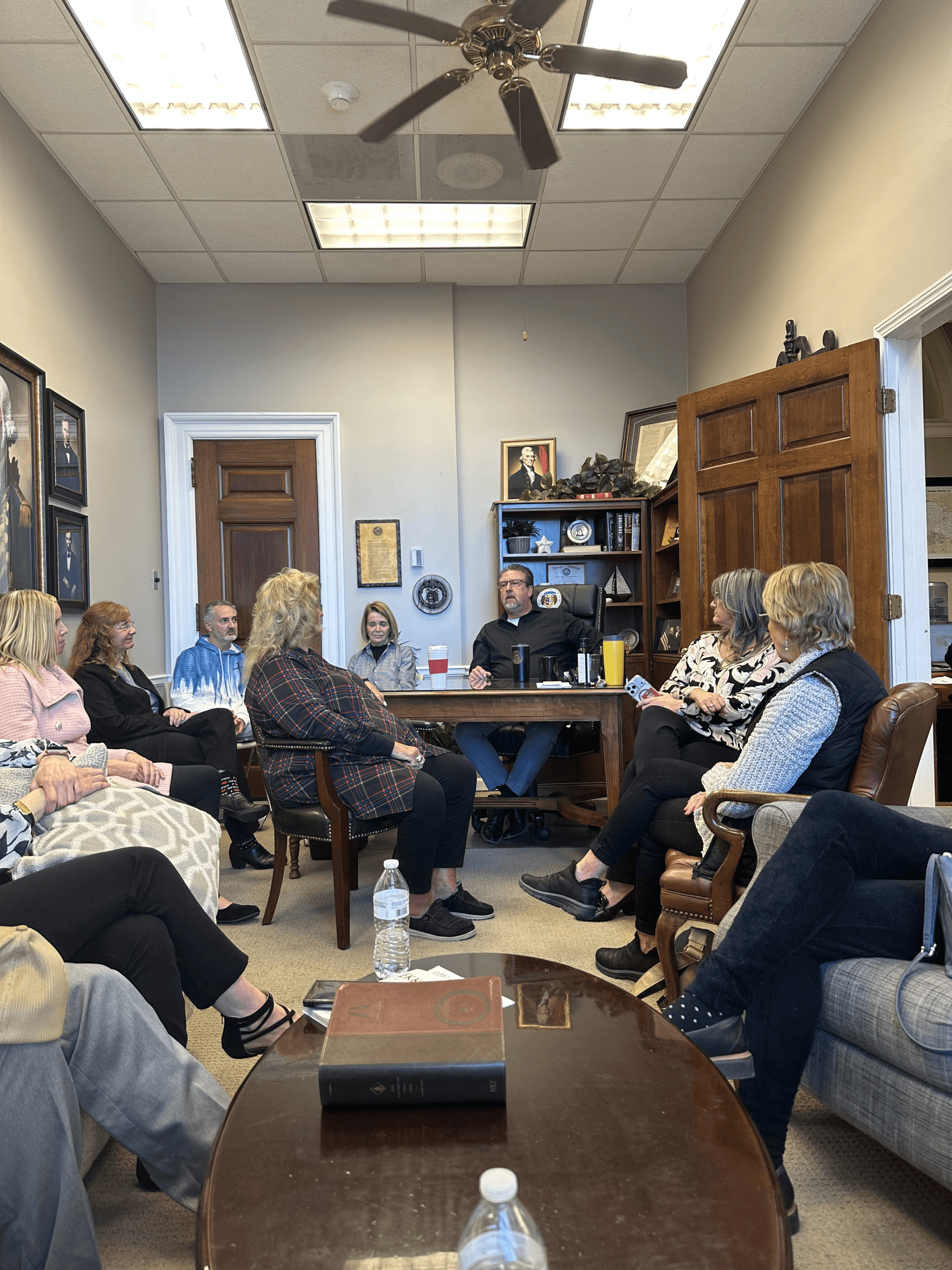
As session moves forward we are shifting from conversations to more action. Although we got off to a slow start due to the winter storm, the momentum is growing. Committees met, hearings were conducted and votes were taken, moving legislation from committee to the formal calendar. Next week, floor debates should begin.
This Week in Pictures

Reviewing legislation in preparation for committee.

Waiting to present my bill in the Transportation committee

Hearing testimony in Families, Seniors & Health Committee.

Speaking on the senate floor

Week 3 at the Capitol was productive and focused. My priorities remain clear: real property tax relief for everyone, defending and preserving the Constitution, and protecting families. Watch the video to hear about our progress this week.
This Week in Photos
The photos below highlight a busy week both inside and outside the Capitol. We welcomed several visitors and made it a priority to meet people in the district, listening to their concerns and sharing updates on the work done on their behalf.

Nurse anesthetist students stopped by to discuss licensing concerns.

Advocates from Starling Missouri

Interviewing Kamal Saleem

Requesting committee hearings

Visiting with workers concerned about Artificial Intelligence

Sponsoring Dr. Lee Harris, an appointee to the State Committee of Professional Counselors

Advocates from Freedom Principle

In the district, I visited Oak Grove School District and met
the new FFA teacher & President of their club. This is the first
year Oak Grove has had FFA and they are doing a wonderful job!

While I was at Oak Grove High School, I was honored to
speak to the AP Government class.

At my desk on the chamber floor

Chairing the Families, Seniors & Health committee

Today, an important bill I sponsored took a great step forward. SB 1011 which protects Missouri's Constitution and rule of law was combined with Senator Nick Schroer's SB 977 and voted out of the Judiciary Committee with a vote of 4-2. I'm grateful to the committee members who saw the importance of this issue and helped to move it forward.
The next step is for the Senate Pro Tem to call it out of committee and on to the formal calendar so it can be debated on the senate floor.
What SCS 977 & 1011 Does
This bill is straightforward and necessary. It:
- Prohibits Sharia Law from being adjudicated in Missouri courts
- Prevents international and foreign policies from being implemented in Missouri
- Clearly affirms the US Constitution and Missouri Constitution are the supreme law of the land
Missouri should be governed by Missouri law and United States law - nothing else.
Why This Law Matters Now: Kamal Saleem's Story
I often hear people people say, "This can't happen here."
But across the country we are already seeing situations that raise serious concerns about foreign legal systems and ideologies being normalized in public life. Sharia is not just a religion - it is a legal system.
I interviewed Kamal Saleem, a former Muslim terrorist, who was sent to the United State for civilization jihad. He shares part of his story and explains what Sharia is as well as why it's important to protect our legal system.
If you remember one thing about this issue - remember that Sharia is more than a religion. It's a legal system.
In countries or areas where it is enforced, Sharia governs:
- Family law
- Criminal punishment
- Women's rights
- Religious freedom
Sharia provisions are in direct conflict with the Constitution, including equal protection, due process, and freedom of religion.
This bill ensures those those conflicts never enter Missouri courtrooms.
This is About Protecting Liberty & Freedom
This bill does not ban Islam.
It does not prevent private religious practice.
It does not single out individuals.
SCS 977 & 1011 protects one rule of law for everyone - the Constitution.

It was a full and productive week in the Senate.
State of the State Address
Tuesday, Governor Kehoe shared his priorities for Missouri in the State of the State Address. During his speech, he announced his legislative and budget priorities which included;
- Eliminating state income tax
- Sentencing reform, which is being sponsored by me
- Juvenile crime reduction
- Supporting nuclear power sources
- Open enrollment
- School accountability grade card

First Committee Hearings
Committee hearings began this week. I sit on four standing committees:
- Families, Seniors & Health; Vice-Chair
- Local Government, Elections & Pensions
- Veterans and Military Affairs
- Progress & Development
We heard two bills in Families, Seniors & Health as well as three in Veterans & Military Affairs and two in Progress & Development. Local Government did not have a hearing but that will begin this upcoming week.
I also sit on the Select Committee on Property Tax and the State Tax Commission. This committee will hear all property tax related bills and I'm looking forward to working for the people of Missouri by reducing their real property tax burden.
My property tax bill is SB 919, which places a 5% cap on increases in real property tax liability every 2 years or the Consumer Price Index, whichever is less.

Presenting the No Sharia Act
Wednesday I had the opportunity to present my first bill of this session, the No Sharia Act, in the Judiciary Committee. This bill supports and protects Missouri from being required to follow the rules or dictates of international organizations such as; World Economic Forum, The United Nations and the World Health Organization. It also prohibits our courts from adjudicating cases based on Sharia Law.
During the hearing, I was able to read the testimony of Kamal Saleem, a friend of mine who is an ex-Muslim terrorist. He was raised in the country of Lebanon in a Muslim home and lived under Sharia. His story is eye-opening and his first hand experiences with radical Islam's infiltration of the United States should be a wake up call to us all.
Prayer & Fellowship
One Thursday each month our office hosts prayer & fellowship and that started this week as well. It's always an encouragement to gather with believers, focus on the Lord and take time to fellowship and have meaningful discussions. I was honored to speak with the group. It was the perfect way to end a busy week.


As a state senator, my job is to work for you by protecting your freedom and liberty. I believe you deserve to be informed about what I'm working on, why it matters and how you can follow along with the legislative process.
My top priorities focus on protecting families, homeowners and personal liberty. Here's a simple overview of the first six bills I filed.
SB 919: 5% Cap on Real Property Tax Liability
Many Missourians are struggling with outrageous hikes in their property tax bills. SB 919 limits the liability increase to 5% or the Consumer Price Index, whichever is less. This bill will help families stay in their homes and plan for the future.
SB 920: Protecting Homeownership
It's the American dream to own a home and it's getting more difficult to accomplish. One factor contributing to this is the influx of private equity firms and hedge funds purchasing residential properties which is pushing prices upward. SB 920 aims to impose sensible restrictions on the number of residential properties large investment groups can acquire.
SB 921: Protecting Choice & Privacy
Technology is meant to simplify our lives, not limit our options. SB 921 guarantees Missourians will always have the option to choose their legal identification. This legislation safeguards personal choice, privacy and access for all without compelling individuals to adopt a digital ID.
SB 1010: Protecting Parents & Families
Parents are the best judges of their children's needs. SB 1010 safeguards families by ensuring children are not removed from their homes solely due to the parents differing beliefs about gender transition or sexual orientation.
SB 1011: Protecting Missouri's Sovereignty
Missouri should be governed by Missourians - not international organizations. SB 1011 is The No Sharia Act and it draws a clear line. Organizations like the World Health Organization, the World Economic Forum and The United Nations have no power or authority in this state.
SB 1012: Protects Elections & Children From AI Harm
We must safeguard our children and our electoral processes. With the rapid advancement of artificial intelligence, both our children and our elections face potential threats. SB 1012 aims to shield them from exploitation.
Keeping You Informed
I believe government should operate with transparency, integrity and clarity. My office is dedicated to being a reliable resource for Missourians who wish to stay informed or get involved. Our goal is to make it simple for you to access information about bills, view my voting record, and understand key issues affecting Missouri.
Check out the ways you can learn and connect.
See All My Bills
You can see a list of all my bills by clicking the "My Bills" menu option at the top of the page. Also, you'll find all the details about each bill including summaries & actions taken by using my official senate webpage.
Subscribe to The Digest
The Senator's Digest is my weekly update to keep you informed about the latest happenings in the Senate and to address key issues. Here, you'll also find my voting records published every week. When you subscribe, you'll receive these articles directly in your inbox upon release. Rest assured, we respect your privacy and will not share your information. You can anticipate up to 2-3 emails each week throughout the legislative session.
Follow Me On Social Media
You can find me on FaceBook & X. Please follow & share!
Your Voice Matters
The lawmaking process works best when voters are involved. You can contact my office to share your thoughts, follow a bill, attend a hearing, and sometimes more. My goal is to help you always know what's happening and how you can make a difference.
Thank you for taking time to participate. My office is here to serve you and be a trusted resource throughout the legislative session.





